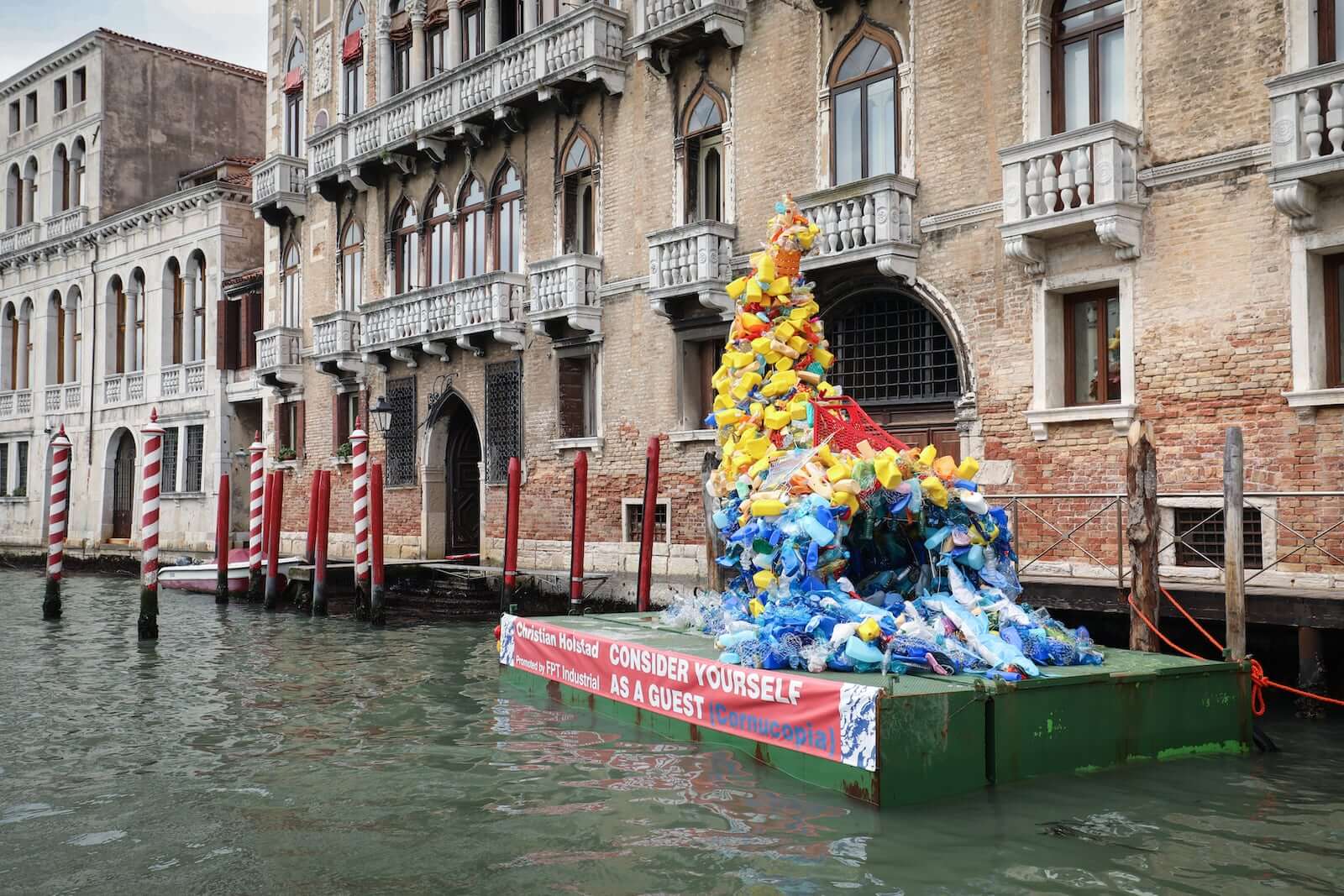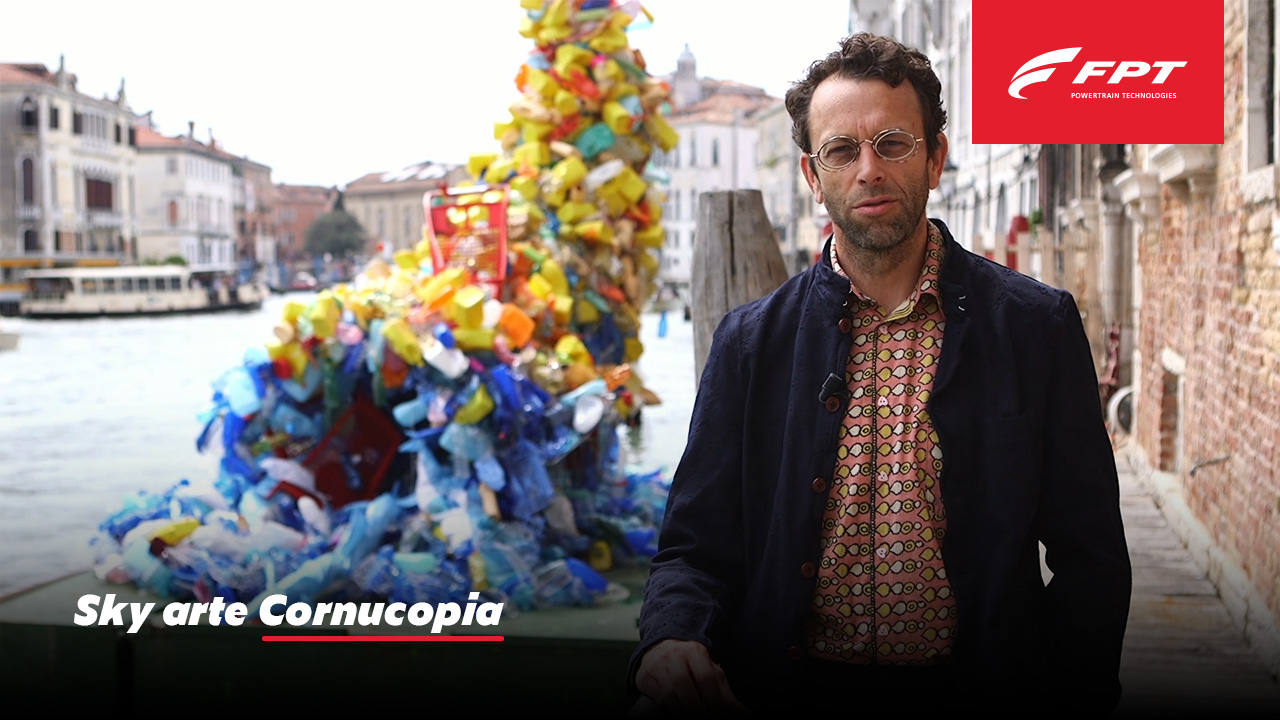
FPT INDUSTRIAL ANNOUNCES ITS COMMITMENT TO ART, SUPPORTING THE ITALIAN PAVILION AT THE 58TH INTERNATIONAL ART EXHIBITION – LA BIENNALE DI VENEZIA
The Brand, a leader in the powertrain sector, is the Main Sponsor of Padiglione Italia at Biennale Arte 2019 and will present, in Venice, a large installation by American artist Christian Holstad who,invited by Milovan Farronato, has conceived an artwork inspired by the theme of protecting the marine environment from plastic waste.
The work, entitled Consider yourself as a guest (Cornucopia), will be displayed at the Ca’ Foscari University of Venice, Italy, from 9 to 11 May 2019 on the banks of the Canal Grande and, from 12May to 12 Jun e2019, in the Ca’ Foscari University of Venice quadrangle.
With the site-specific installation by Christian Holstad, Consider yourself as a guest (Cornucopia), FPT Industrial, a global brand of CNH Industrial and a leader in the production of industrial engines, announces its commitment to support the arts. The artwork will be exhibited at Ca’ Foscari University of Venice: from 9 to 11 May2019on the banksof the Canal Grande and from 12 May to12 June 2019, it will be displayed at the university quadrangle.
The project demonstrates not only FPT Industrial’s commitment to the art world, to which its role as the Main Sponsor of Italian Pavilion at the 58th International Art Exhibition – La Biennale di Venezia is testament, but also its concrete commitment to sustainability and environmental protection, specifically of sealife, stemming from the importance marine engine production has for the Brand.
To this end, from April 2019, FPT Industrial is a partner for the European Clean Sea Life project which promotes awareness-raising activities aimed at protecting the sea from waste pollution. In 2018, the Clean Sea Life pilot initiative saw the involvement of twelve fishing boats from San Benedetto del Tronto, East coast of Italy, which, in one work day, collected 385 kg of waste from the sea, demonstrating the need to spread good practices regarding this subject.
< br/="" />
“These are awareness-raising projects which we believe are a ‘must’ for a Brand such as ours – says Carlo Moroni, Head of Communication of FPT Industrial – which has always invested in research, with the goal of producing cutting-edge and sustainable engines that are also environmentally friendly. The Holstad installation and the Italian Pavilion sponsorship are a way of further consolidating our commitment, to support cultural production, and to pay homage to Venice, a city which absolutely represents the influence of water on our lives”.
Invited by Milovan Farronato, Christian Holstad conceived a site-specific piece, inspired by the constant news about pollution of the seas and oceans around the world, owing to his focus on the subject of consumerism and its subsequent effect on the world.
A cornucopia, an ancient symbol of luck and abundance, made entirely with plastic waste, becomes the chance to reflect on the urgency of tackling the issue of pollution of our seas. The classical meaning of this iconic image is thus distorted by the artist, taking on a new negative sense of “excess”.
“A past neighbor had a sign on their door which read "Consider yourself a guest". I walked past it each day for years and it became an unintended mantra”, says Christian Holstad. “Our dependence on plastics is not sustainable. Its effects are swelling into continents in our waters. Consider yourself a guest (Cornucopia) is a reflection of our impact on the planet and our consumptive roles within the growing plastic mass”.
Consider yourself as a guest (Cornucopia) aims to raise public awareness in a clear and immediate way, literally “bringing to the surface” a topical problem rather than leaving it hidden in the depths of the sea.
The presentation of the work at the Ca'Foscari University of Venice confirms the ethical vocation of the project: indeed, since 2010, through the Ca' Foscari Sustainable program, the university tries to encourage actions and behaviours that reduce the university’s impact on the environment and natural resources, and to promote the well-being of the community, social equity and economic development.
Exhibited during the 58th International Art Exhibition – La Biennale di Venezia, with FPT Industrial as Main Sponsor of the Italian Pavilion, Consider yourself as a guest (Cornucopia) by Christian Holstad marked the very beginning of the Brand’s commitment to the art world and the confirmation of its continuous dedication to sustainability and environmental protection, specifically of marine life. Upon the invitation of Milovan Farronato, Christian Holstad conceived a site-specific piece: his cornucopia, an ancient symbol of luck and abundance, made entirely from plastic waste, prompts reflection on the urgent need to tackle the issue of sea pollution.
FPT Industrial was also partner of Artissima 2019, presenting the installation Consider yourself as a guest (Cornucopia) by Christian Holstad, which became the key feature of a new special outdoor installation welcoming guests at the entrance of the Artissima fair in Turin. The brand also sponsored the Artissima Walk guided tours program, the ART FOR THE FUTURE tours that gave visitors the opportunity to discover the fair in a personal and exciting way by traveling down a path focused on art research, addressing environmental issues, sustainable development, protection of biodiversity and adapting to climate change.

